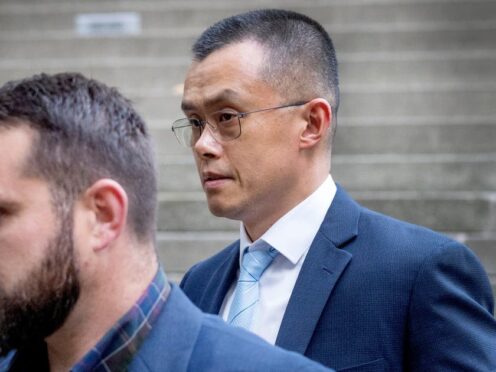Former Binance chief executive Changpeng Zhao has been sentenced to four months in prison for allowing rampant money laundering on the world’s largest cryptocurrency exchange.
Zhao pleaded guilty in November to one count of failing to take required anti-money laundering measures and stepped down as Binance agreed to pay 4.3 billion dollars (£3.4 billion) to settle related allegations.
US officials said Zhao deliberately looked the other way as people conducted transactions that supported child sex abuse, the illegal drug trade and terrorism.
“I failed here,” Zhao said before US District Judge Richard A Jones issued the sentence. “I deeply regret my failure, and I am sorry.”
The three-year prison term prosecutors sought was more than twice the guideline range for the crime. If he did not receive time in custody for the offence, no one would, rendering the law toothless, they argued.
Binance allowed more than 1.5 million virtual currency trades, totalling nearly 900 million dollars (£719 million), that violated US sanctions.
“He made a business decision that violating US law was the best way to attract users, build his company, and line his pockets,” the Justice Department wrote in a sentencing memorandum filed last week.
Zhao’s lawyers insisted he should receive no prison time at all, citing his willingness to come from the United Arab Emirates, where he and his family live, to the US to plead guilty, despite the UAE’s lack of an extradition treaty with the US.
No one has ever been sentenced to prison time for similar violations of the Bank Secrecy Act, defence lawyers Mark Bartlett and William Burck told the judge on Tuesday, and Zhao began making changes to make Binance a model of compliance with banking transparency regulations before stepping down.
“There is no excuse for my failure to establish the necessary compliance controls at Binance,” Zhao wrote in a letter to the court.
“I wish I could change that part of Binance’s story. But under my direction, Binance has now implemented the most stringent anti-money laundering controls of any non-US exchange, and those controls have been in place since 2022.”
Prosecutors said no one had ever violated the Bank Secrecy Act to the extent Zhao did.
“He says in hindsight he should have done a better job,” Justice Department lawyer Kevin Mosley told the court. “This wasn’t a mistake. When Mr Zhao violated the BSA he was well aware of the requirements.”
Zhao knew that Binance was required to institute anti-money laundering protocols, but instead directed the company to disguise customers’ locations in the US in an effort to avoid complying with US law, prosecutors said.
The cryptocurrency industry has been marred by scandals and market meltdowns. Most recently. Nigeria has sought to try Binance and two of its executives on money laundering and tax evasion charges.
Zhao was perhaps best known as the chief rival to Sam Bankman-Fried, the founder of the FTX, which was the second-largest crypto exchange before it collapsed in 2022. Bankman-Fried was convicted last November of fraud for stealing at least 10 billion dollars from customers and investors and sentenced to 25 years in prison.
Zhao and Bankman-Fried were originally friendly competitors in the industry, with Binance investing in FTX when Bankman-Fried launched the exchange in 2019.
However, the relationship between the two deteriorated, culminating in Zhao announcing he was selling all of his cryptocurrency investments in FTX in early November 2022. FTX filed for bankruptcy a week later.
Zhao’s lawyers also argued that he would not be safe in prison. Because he is not a US citizen, he is ineligible for placement in a minimum security facility.
Given his high-profile status and wealth, as well as Binance’s co-operation with US law enforcement in certain investigations, he might be a target for violence in a medium security prison, they suggested.
